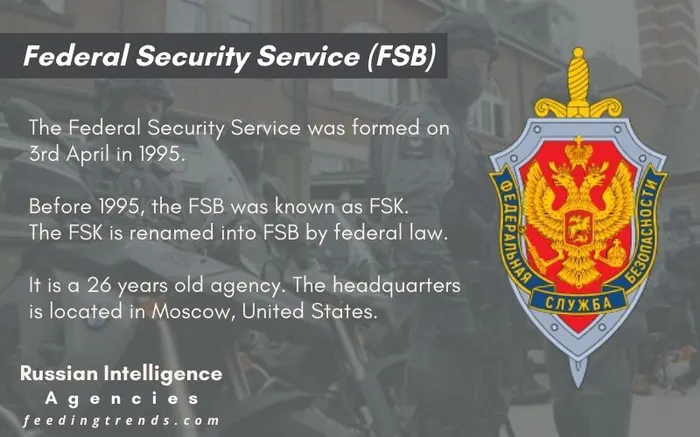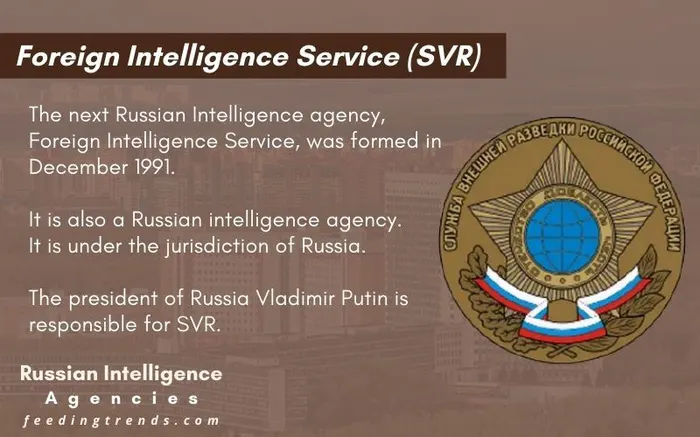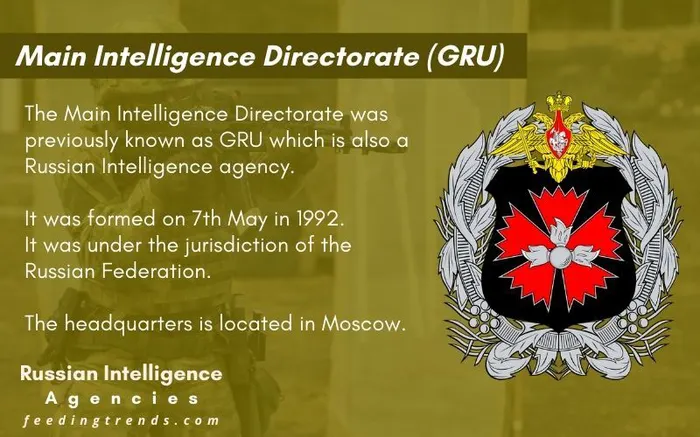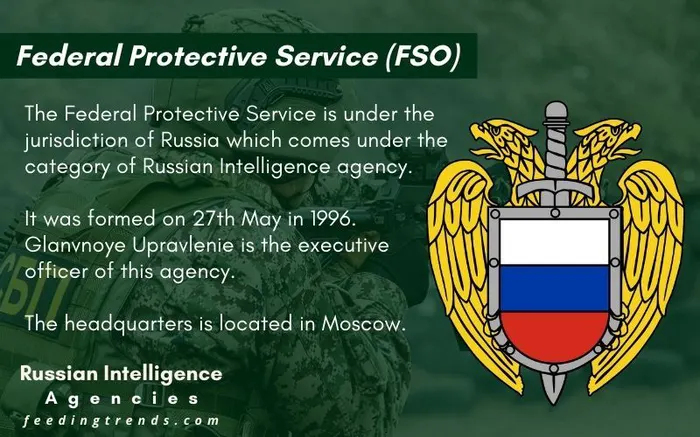The prime duty of Russian intelligence agencies is to ensure the safety of the nation and to assist in the security and making of the foreign policy of the nation.
Russian intelligence agencies complete their tasks by gathering, observing, and using information that’s beneficial for law, military operations, and public safety. Collaboration with government organizations is also a practice to address difficult issues like defense and fighting terrorism.
The Russian intelligence agencies, including the Federal Security Service (FSB), Foreign Intelligence Service (SVR), Main Intelligence Directorate (GRU), Federal Protective Service (FSO), and Main Directorate of Special Programs of the President of the Russian Federation (GUSP), have a history and various abilities in fields like counterintelligence, foreign intelligence, and military intelligence.
The Russian Federation has a complex network of intelligence agencies, each with its own specific role and hierarchy of command. Here’s a brief overview of their history and the formation of the primary Russian intelligence agencies:
1. Federal Security Service (FSB)

The Federal Security Service (earlier FSK) was established in 1995, with headquarters in Lubyanka Square, Moscow.
The FSB is responsible for counter-intelligence, internal and border security, counter-terrorism, and investigation within Russia. It also conducts intelligence activities in the Commonwealth of Independent States (CIS).
This Russian intelligence agency reports to the President of Russia.
2. Foreign Intelligence Service (SVR)

Formed in December 1991, the Foreign Intelligence Service of Russia’s headquarters is located in Yasenevo, Moscow.
The SVR is tasked with intelligence and spying activities outside the Russian Federation. It focuses on civilian affairs and collaborates with the military intelligence agency. It also reports its activities to the President of Russia.
3. Main Intelligence Directorate (GRU)

The GRU is the primary intelligence service of the Russian Armed Forces and is reputedly Russia’s largest foreign intelligence agency.
It was formed on December 20, 1920, with the headquarters located in Khoroshevskoye Shosse, Moscow. Mainly responsible for security, it reports to the Chief of the General Staff and the Minister of Defense.
4. Federal Protective Service (FSO)

Coming under the jurisdiction of Russia, FSO was formed in 1996. The headquarters of this Russian intelligence agency is located in Moscow, Russia.
The FSO is focused on maintaining the safety of high-ranking state officials, including the President of Russia, as well as certain government properties. For this exact reason, it reports to the President of Russia.
5. Main Directorate of Special Programs of the President of the Russian Federation (GUSP)
The GUSP makes sure to fulfill the President’s duties in the field of mobilization training and mobilization within the country itself. The organization also reports to the President of Russia.
Its main duty is to modernize and reconstruct the existing government’s structure.
Formation Year: Originally established on January 6, 1977. It was later revived on January 5, 1994.
The GRU, while a fundamental part of the General Staff of the Russian Armed Forces, may also report to the President of Russia if ordered so. The directors of the FSB and SVR are permanent members of the Security Council of Russia, which is also a consultative body under the President.
The Committee for Security and Defense of the Union Council and the Committee for Security and Anti-Corruption of the State Duma are in charge of parliamentary oversight over these intelligence organizations.
Russia is the largest country by area in the world, and all the Russian intelligence agencies play vital roles in global intelligence activities and are considered the best intelligence agencies in the world. The impact of each agency varies depending on factors like experience, human resources, cyber capabilities aligned with interests, and strategic goals.
These organizations are slightly different from each other, but they all ultimately report to the President of Russia, who directs these agencies. All combined, these Russian intelligence agencies make the country look strong around the world.

